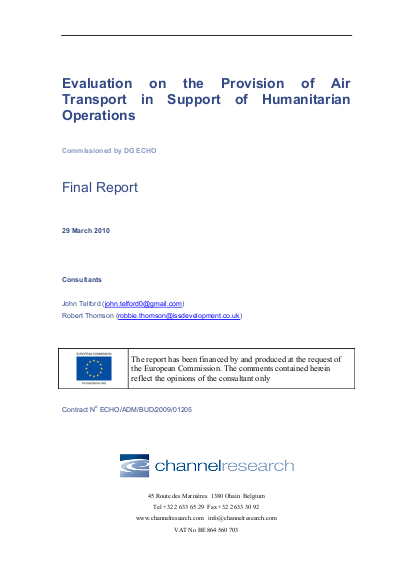
The evaluation examines DG ECHO’s support of humanitarian air transport from 2003 – 2008 (with the emphasis on the last three years). The review researches approaches and best practices in the funding and provision of humanitarian air transport. The study was conducted from the end of October 2009 until February 2010.
DG ECHO has provided over 100M€ to support humanitarian air transport from 2003 – 2008. From the financial data in the annexes, one can see that total annual funding has increased steadily; the largest single recipient has been WFP/UNHAS; and following the dramatic drop in 2004, by 2008, ECHO-Flight was almost back to its 2003 level, at some 8M€. Similar trends exist for 2009.
Three humanitarian air services were selected as case studies: UNHAS Afghanistan and Sudan (with the emphasis on South Sudan); ECHO-Flight (operational in DRC and Kenya); and Pactec (Afghanistan). Other services were consulted and/or examined to a lesser degree (such as ICRC and ASF-Belgium). The report and this summary concentrate on these cases. The review takes the findings from these cases and, combined with broader research, addresses a number of questions and challenges relevant to the future of DG ECHO’s support of humanitarian air transport. Based on a systematic and random selection of passengers on flights or at airstrips, spot-checks on manifests, reviews of passenger data reports, meetings with users,interviews with key informants, review of security and logistics reports and through on-site observations, the evaluators are convinced that the majority of users of the humanitarian air transport services reviewed in this evaluation are humanitarian staff travelling for legitimate reasons. In addition, and as explained in the review report, the need for such air transport is increasing, linked to security constraints and inaccessibility of remote locations.
